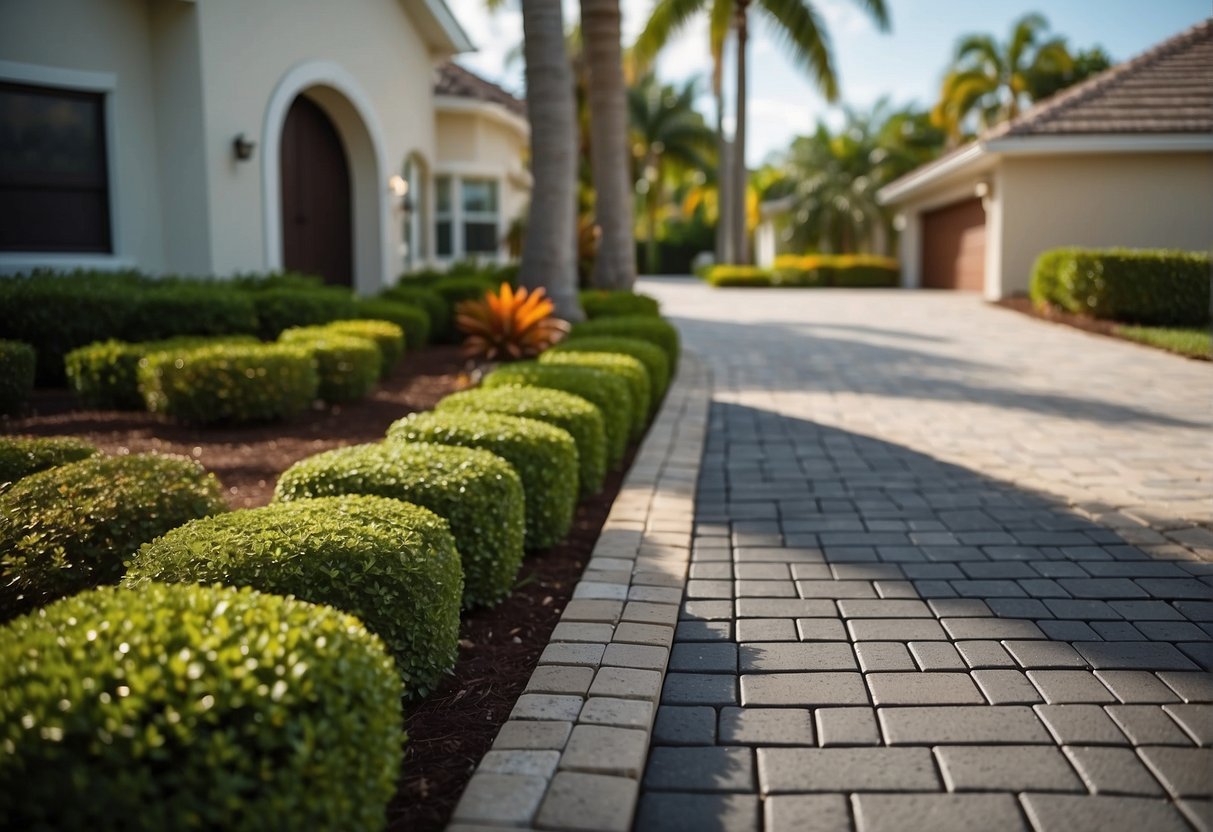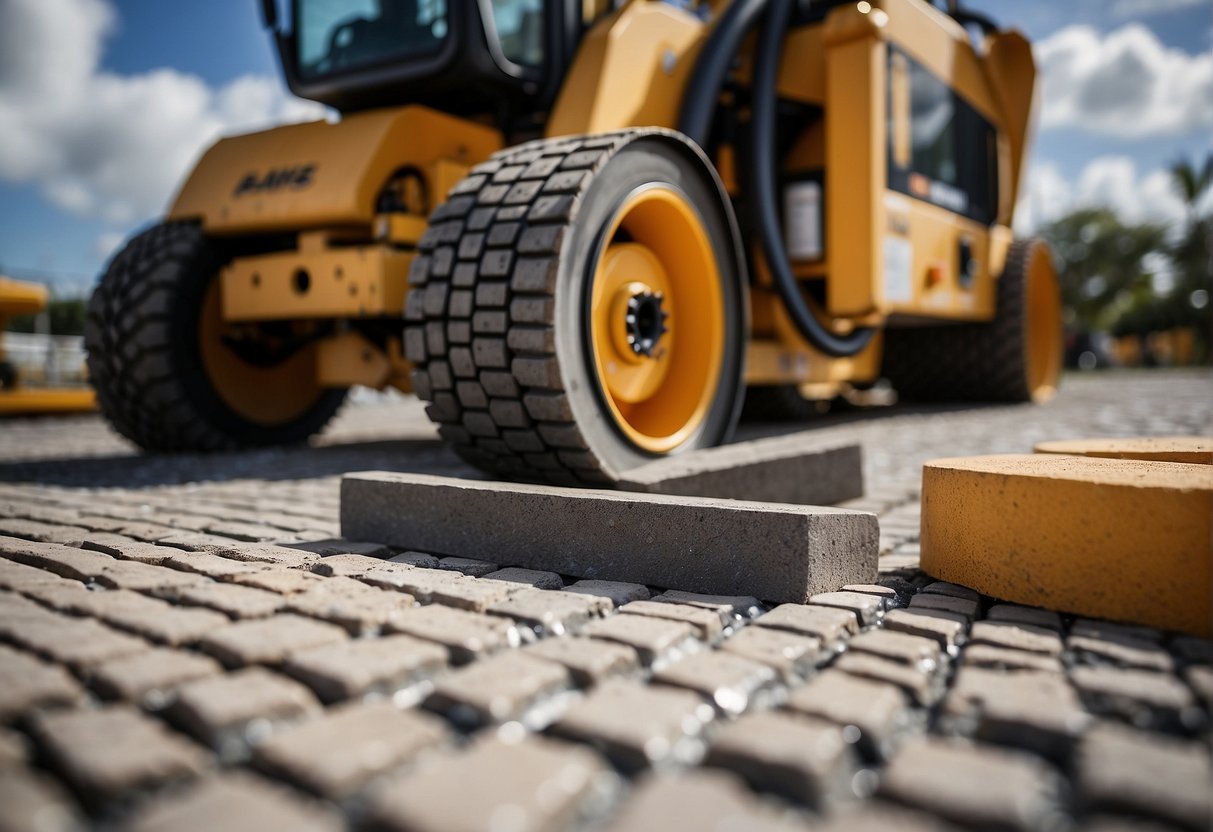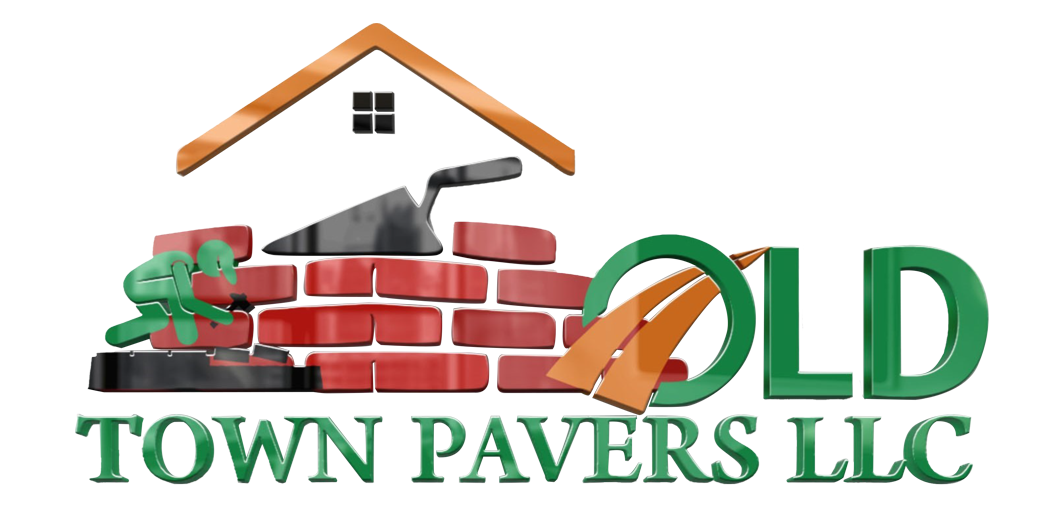Introduction to Permeable Pavers

Permeable pavers present a sustainable solution for Fort Myers’ landscaping, combining durability with aesthetics while mitigating stormwater runoff.
Types of Permeable Pavers
When considering permeable pavers, it’s essential to understand the different materials available. Stone, brick, and concrete are the most common types used in settings that value both aesthetic appeal and functionality. We see that stone pavers typically offer a natural look and can be found in various shapes and sizes, fitting into diverse design schemes. On the other hand, brick pavers provide a classic appearance with strong color retention qualities. Concrete pavers are versatile and can be crafted to mimic the appearance of natural stone or brick, providing a cost-effective yet robust solution for our landscape.
- Stone Pavers: Offer a natural aesthetic; highly durable.
- Brick Pavers: Classic look; strong color retention.
- Concrete Pavers: Cost-effective; mimics stone or brick.
Benefits of Permeable Pavers
Permeable pavers offer numerous benefits, significantly enhancing Fort Myers’ landscapes’ functionality and appearance. Their permeable nature allows water to percolate through the surface, reducing runoff and promoting groundwater recharge. We appreciate their longevity and low maintenance needs, making them a wise investment for the long term. Aesthetic appeal is not sacrificed, as their design flexibility allows us to create beautiful, environmentally friendly spaces.
- Eco-Friendly: Reduces runoff; promotes groundwater recharge.
- Durability: Resilient against weather and traffic.
- Low Maintenance: Requires minimal upkeep over its lifespan.
- Aesthetically Pleasing: Variety of designs and materials to complement any setting.
Assessing Project Needs
When selecting permeable pavers for a project in Fort Myers, we must consider the unique aspects of the area. Assessing the specifics of the property, including soil conditions and design requirements, helps us pinpoint the best materials and installation approaches.
Evaluating Soil Conditions
Soil Type and Drainage:
- Sandy soil: Typically has good drainage and may not require extensive sub-base layers.
- Clay-rich soil: Often has poor drainage, necessitating a more robust drainage solution and substrate.
Permeability Tests:
- We perform these tests to gauge how quickly water permeates the soil, crucial for determining the paver system’s design.
Design and Layout Planning
Determining Square Footage:
- We calculate the area in square feet to estimate the volume of materials needed and the project’s scope.
Customization and Adaptability:
- We design layouts that cater to the property’s unique features and shapes.
- Consideration for foot or vehicle traffic patterns ensures our design meets functional requirements.
Property Assessment
Identifying Zoning and Permit Requirements:
- It’s essential to understand local regulations that may impact design choices and installation.
Unique Property Features:
- We take note of any significant landscaping, pre-existing structures, or slope gradients that could influence paver placement and design.
By methodically evaluating these areas, we ensure our project aligns with the specific needs of the property while adhering to Fort Myers’ local regulations and environmental conditions.
Cost Factors for Paver Installation
When considering permeable paver installation in Fort Myers, it’s essential to understand that several factors will influence the overall cost. These include material choices, labor expenses, project size, and the kind of preparation the site requires.
Material Choices and Their Costs
The cost of permeable pavers mainly depends on the type of materials chosen. Options vary widely and can range from $0.50 to $40 per square foot.
- Concrete pavers: Typically cost between $5-$20 per square foot.
- Brick pavers: Usually range from $10-$30 per square foot.
- Stone pavers: Can run between $25-$40 per square foot.
Labor Costs and Considerations
Labor costs for paver installation are influenced by the complexity and timeline of the project, as well as the local market rates.
- Simple installations: May start as low as $2 per square foot for labor.
- More complex projects: Can increase labor costs to upwards of $10 per square foot.
Size and Scope of the Project
The total cost of installation rises with the project’s size. Larger projects benefit from economies of scale which might reduce the cost per square foot.
- Small areas: Higher cost per square foot due to fixed overhead costs.
- Large installations: Potential for lower cost per square foot overall.
Preparation and Base Requirements
Preparation and base requirements are critical to the longevity of the installation, affecting both materials and labor.
- Site preparation: Can include clearing, excavation, and grading. Involves additional cost.
- Base materials: Different base materials will impact the total cost.
- Crushed stone: Often used for its permeability and cost-effectiveness.
- Sand: Required as a setting bed for pavers.
Rates for preparation and base work can range significantly, from $12 to $30 per square foot, depending on the complexity of the work required.
Selecting the Right Contractor
When embarking on a project involving permeable pavers in Fort Myers, choosing a capable contractor is pivotal. We must consider their experience, ensure they have the appropriate licenses and insurance, and receive a precise estimate for the services they will provide.
Experience and Credentials
We look for contractors with a proven track record in installing permeable pavers. It’s essential to review their portfolio of completed projects to assess their quality of work.
- Years of Experience: Examine the number of years they’ve been in the industry.
- Portfolio: Request to see previous projects similar to ours.
Licensing, Bonding, and Insurance
A reliable contractor should be thoroughly vetted to ensure they are legally compliant and protected.
- License: Verify that they are licensed to operate in Fort Myers.
- Bonded: Confirm that the contractor is bonded, which provides financial assurance.
- Insurance: Ensure they have liability and workers’ compensation insurance.
Getting an Accurate Quote
We must obtain a detailed and transparent quote that outlines all costs involved.
- Itemized Estimate: Look for a breakdown of materials, labor, and any additional fees.
- Total Cost: Confirm the total cost of the project, making sure there are no hidden charges.
Installation Process and Techniques

Permeable pavers are a sustainable choice for effective landscaping in Fort Myers. We will guide you through the critical aspects of the installation process, ensuring a functional and aesthetically pleasing outcome.
Pre-installation Tasks
Before we begin the installation of permeable pavers, it’s essential to prepare the site. We conduct a thorough inspection of the area, ensuring proper drainage and a stable base for the pavers. We also confirm that all necessary materials are available and ready for use.
- Site Inspection: Check for optimal drainage and ground stability.
- Materials Checklist: Ensure all pavers, aggregates, and necessary tools are on hand.
Steps for Installing Permeable Pavers
The installation of permeable pavers involves a sequence of precise steps that must be followed to guarantee their efficacy and durability.
- Site Excavation: Remove soil to the appropriate depth to accommodate the base, aggregates, and pavers.
- Base Preparation: Lay and compact the base material, which typically consists of crushed stone.
- Edge Restraints: Install edge restraints around the perimeter of the project area to hold pavers in place.
- Laying Pavers: Place the pavers in the desired pattern, leaving spaces for water permeation.
- Filling Joints: Spread fine aggregate over the pavers and sweep it into the joints.
- Compaction: Compact the pavers and aggregate to set them firmly in place.
Post-installation Procedures
Once the permeable pavers are installed, there are essential post-installation procedures we follow to ensure the long-term success of the paving system.
- Cleaning: Remove any debris and excess material from the surface of the pavers.
- Sealant Application (Optional): Apply a quality sealant to provide additional protection against the elements, if desired by the customer.
- Final Inspection: We conduct a final assessment to ensure the installation meets our quality standards and the expectations of our client.
Regulations and Permits in Fort Myers
In Fort Myers, Florida, we must navigate a variety of regulations and permits when it comes to the installation of permeable pavers.
Understanding Local Requirements
We need to be aware of specific local zoning laws and environmental regulations that impact the use of permeable pavers in Fort Myers. These requirements are developed to manage stormwater effectively and to reduce runoff into local waterways. It’s important to follow Fort Myers’ guidelines to ensure our project aligns with local sustainability goals.
- Itemize local requirements:
- Stormwater management
- Zoning ordinances
- Environmental protection rules
Securing Necessary Permits
Before starting our project, securing the necessary permits from the City of Fort Myers is crucial. The permit process involves submitting detailed plans for review and obtaining approvals from the relevant city departments.
Steps to secure permits include:
- Application Submission: We prepare and submit our permit application along with project plans to the City of Fort Myers.
- Plan Review: City officials review our plans to ensure compliance with all local regulations.
- Permit Issuance: Upon successful review, we receive our permits, allowing us to proceed with the installation of permeable pavers.
- Required documents:
- Site plan
- Installation details
- Stormwater management plan
To stay compliant and avoid potential delays or fines, we place utmost importance on understanding and adhering to these local requirements and securing all the proper permits before commencing our work in Fort Myers.
Maintenance and Care
Proper maintenance and care are essential to maximize the lifespan and effectiveness of permeable pavers in Fort Myers. We’ll guide you through the routine tasks required and considerations for repair and replacement to keep your permeable paving system functioning optimally.
Routine Maintenance Tasks
To maintain the permeability and appearance of your pavers, regular cleaning is crucial. We recommend semi-annual inspections to remove any debris or sediment buildup that could clog the pores of the paving surface. Here’s a brief rundown of the tasks:
- Sweeping: Regularly use a stiff broom or a leaf blower to clear loose debris.
- Vacuuming: Semi-annually, use a commercial-grade vacuum sweeper to remove finer particles lodged in the pavers.
- Weed Prevention: Applying a pre-emergent herbicide can help prevent weed growth in the joints.
- Jet Washing: Occasionally, a jet wash may be necessary to remove stubborn deposits, but ensure a low-pressure setting to avoid dislodging the aggregate or damaging the pavers.
Remember to check weather conditions before commencing cleaning, as overly wet or dry weather can affect the efficacy of your maintenance routine.
Repair and Replacement Considerations
While permeable pavers are known for their durability, occasionally individual pavers may need to be repaired or replaced due to wear or damage. It is usually a straightforward process, given the modular nature of the pavers:
- Visual Inspections: We perform visual inspections to identify any pavers that appear to be damaged or significantly worn.
- Assessment of Sealant: An evaluation of the paver sealant should be conducted to determine if reapplication is necessary to protect against stains and facilitate easier cleaning.
- Replacement of Pavers: If a paver is damaged, it can typically be lifted and replaced without disturbing the surrounding units.
When addressing sealant and repair, choosing the right service provider with expertise in the specific type of permeable pavers you have installed is vital. This ensures the maintenance and care are conducted correctly, preserving the system’s integrity and effectiveness.
Financial Considerations
Our aim is to articulate a clear understanding of the financial requirements needed for successful incorporation of permeable pavers into your Fort Myers property. We will guide you through estimating total project costs, followed by how to effectively budget for this investment.
Estimating Total Project Costs
When planning for permeable pavers, the cost per square foot is paramount. These costs can vary widely based on materials, design complexity, and the scale of the project. Typically, estimates range from $10 to $30 per square foot. To deliver a more precise quote, we factor in:
- Materials: The type of permeable pavers you select can influence the cost significantly.
- Installation: Labor is a substantial portion of expenses. It requires preparation of the base, laying the pavers, and setting.
- Site Preparation: This may include excavation, grading, and landscaping.
- Size of Area: Larger areas generally reduce the average cost per square foot due to economies of scale.
A comprehensive quote takes all these elements into account to provide a total project cost.
Budgeting for Permeable Pavers
When setting your budget, it is crucial to consider both upfront costs and long-term financial benefits. To diligently budget for permeable pavers, we recommend the following steps:
- Secure Multiple Quotes: Acquire at least three estimates from reputable contractors to compare.
- Anticipate Extras: Set aside a portion of the budget for unforeseen circumstances or additional features.
- Cost-Benefit Analysis: Account for potential savings in stormwater management charges and long-term durability.
- Maintenance: Include future maintenance costs in your budgeting plan to ensure financial preparedness.
By adhering to these financial considerations, we ensure that your investment in permeable pavers is realistic and well-planned.
Additional Installation Elements
When evaluating the cost considerations for permeable pavers installation in Fort Myers, one must pay attention to mobilization time, project management, and associated supplies which may influence the overall budget. We’ll also highlight the importance of understanding sales tax on materials and potential hidden costs.
Mobilization Time and Project Management
Mobilization time refers to the period required to transport personnel, equipment, and materials to the project site. Every project demands a unique setup, which must be handled efficiently to control costs. Project management involves the detailed coordination of a project’s moving parts. These may include:
- Planning and scheduling: A clear timeline that accounts for potential delays.
- Resource allocation: Ensuring labor and materials are available when needed.
- Site supervision: Continuous onsite leadership to prevent costly errors or delays.
Breakdown of labor wages may include:
- Preparation: Surveying, marking, and site clearing activities.
- Installation: Laying down the base, placing, and setting pavers.
- Finishing touches: Filling gaps and final site cleanup.
Labor wages are calculated based on the time spent by workers on these activities, directly influencing the project’s financial framework.
Supplies, Sales Tax, and Hidden Costs
Supplies for permeable paver installation extend beyond the pavers themselves and may include:
- Base material: Gravel or crushed stone that underlies the pavers.
- Edging: Necessary for creating boundaries and maintaining paver alignment.
- Geotextile fabric: Installed beneath the base material to enhance stability and drainage.
Sales tax on materials must be factored into the budget. In Florida, the current state sales tax rate is 6%, with additional local surcharges applicable in some areas, potentially impacting the total cost of supplies.
Hidden costs can emerge unexpectedly and may encompass:
- Permits and approvals: Required documentation from city authorities.
- Unforeseen labor: Additional work due to project complications.
To manage these expenses, we recommend a contingency fund of approximately 5-10% of the project’s total estimated cost to cover unforeseen expenditures.
Frequently Asked Questions
In this section, we cover the most common inquiries regarding the costs involved with permeable pavers in Fort Myers.
What is the average cost per square foot for installing permeable pavers in Fort Myers?
The average cost for installing permeable pavers in Fort Myers typically ranges from $10 to $30 per square foot. This price can vary based on materials, design complexity, and site conditions.
How does the cost of permeable pavers compare to asphalt for driveways and parking lots?
Permeable pavers can be more expensive upfront than asphalt, with asphalt costing about $2 to $5 per square foot. However, permeable pavers offer better stormwater management and can reduce long-term expenses related to water runoff mitigation.
What are the expected maintenance expenses associated with permeable paver installations?
Maintenance costs for permeable pavers mainly involve routine cleaning and occasional replenishment of joint filler material. Annual maintenance costs can range from $0.25 to $1.50 per square foot, depending on the type of pavers and usage.
Can you provide a cost comparison between pervious concrete and regular concrete?
Pervious concrete generally costs approximately $2 to $6 more per square foot than regular concrete. The higher cost reflects the specialized materials and installation techniques required for creating a permeable surface.
What are the long-term financial benefits of choosing permeable pavers over conventional paving options?
Long-term financial benefits of permeable pavers include reduced stormwater runoff fees, potential rebates, and increased property value. These pavers can also extend the lifespan of your paved surfaces by mitigating water damage.
What are some potential drawbacks in terms of costs for choosing permeable pavers?
While permeable pavers have many benefits, initial installation costs can be higher than traditional options, and they may require more frequent maintenance, potentially leading to increased long-term expenses.
